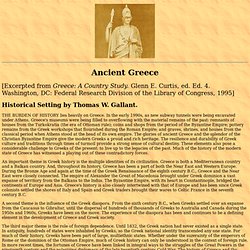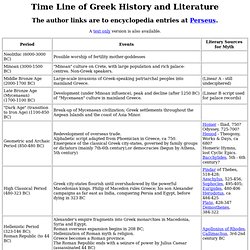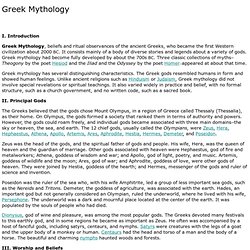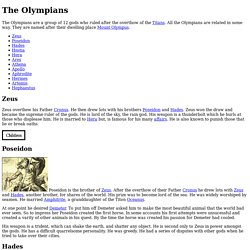Zoom
Trash

The Ancient Greek World. The Ancient City of Athens - Home. The Greeks. History: Greeks. Ancient_Olympics_report.pdf (application/pdf Object) Untitled. Ancient Greece - History, mythology, art, war, culture, society, and architecture. Judy Duchan's History of Speech - Language Pathology. Overview Ancient Greece was in its heyday from around 5th century BC to 2nd century AD.

That period is commonly referred to as the classical period and events in it led to major and long-lasting advances in medicine and rhetoric. Medicine in ancient Greece The ancient Greeks had two main theories that they used to understand bodily functioning, to understand the source of disease, and to guide them in healing diseases. The first theory was that specific gods had the powers to create disease as well as to restore health. Asclepios, (8th C BC) a man who was among the first known physicians in Greece, eventually came to be worshipped a Greek god of health and disease.
The Asclepiades, an ancient guild of doctors from the 6th to the 2nd century Greece, was made up of devotees of Asclepios. One aspect of the cure was that a priest/doctor would represent Asclepios and interpret the pilgrim’s dream so as to identify a cure. Ancient Greece. [Excerpted from Greece: A Country Study.

Glenn E. Curtis, ed. Ed. 4. Washington, DC: Federal Research Division of the Library of Congress, 1995] Historical Setting by Thomas W. THE BURDEN OF HISTORY lies heavily on Greece. An important theme in Greek history is the multiple identities of its civilization. Ancient Greece. Ancient Greece By Teri Doleys Cedarville University History The history of Greece began with the Stone Age hunters and early farmers. This time period was followed by the civilizations of the Minoan and Mycenaean kings. Next came the Dark Ages which was a time period characterized by many wars and invasions.
Chronology. Greek Mythology Link - Home. Classical Myth: Info: Time Line. A text only version is also available.

Classical Myth Homepage | Gods | Help | Time Line | Attributes. Greek Mythology. Mythological stories are based one legends and folklore about Gods and Goddesses who live 'above' the Earth's physical plane.

Mythology generally talks about how these Gods created Earth and the souls that exist within its physical parameters. Many people speak of the interaction of the Gods and Goddesses within their own experiences. There is sometimes mention of the interaction of Gods and Goddesses with humanity. The main Greek Gods were originally the Titans (Cronus) - who seem to have a nasty habit of eating his children.
One of his children, Zeus, was hidden away by his mother until he was grown. Zeus' group of Gods and Goddesses - 12 in all - were called the Pantheon. Greek Mythology. Greek Mythology I.

Introduction. Ancient Greek and Roman Art. In the 8th century BC, large-scale ceramic vessels were produced as grave markers. As these were originally decorated with just repeated angular patterns, the style became known as "Geometric" art. As time went by, small portions of the vessel might be filled with simple stick-figure people, often attending a funeral.
The first image here is a funeray amphora, almost 6 feet tall, with a detail in the second image. The third image is a cross-section of the types of graves in which these vessels are found, showing their placement. The other vase is a little later than the first, with more detail, including a chariot procession. But not all geometric vase-paintings are as monumental in size. The Archaic period of Greek art spans about 200 years, from 700 to 500 BC. Unfortunately, the vast majority of Archaic bronze sculptures no longer exist, having been 'recycled', i.e., melted down for other uses. GREEK MYTHOLOGY. Greek Mythology Gods Olympians. The Olympians are a group of 12 gods who ruled after the overthow of the Titans.

All the Olympians are related in some way. They are named after their dwelling place Mount Olympus. Zeus Zeus overthew his Father Cronus. He then drew lots with his brothers Poseidon and Hades. Poseidon. Odyssey Online: Greece. Greek Mythology.